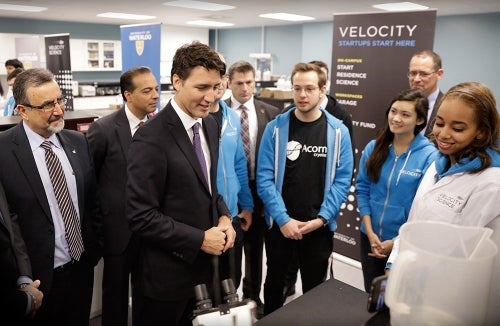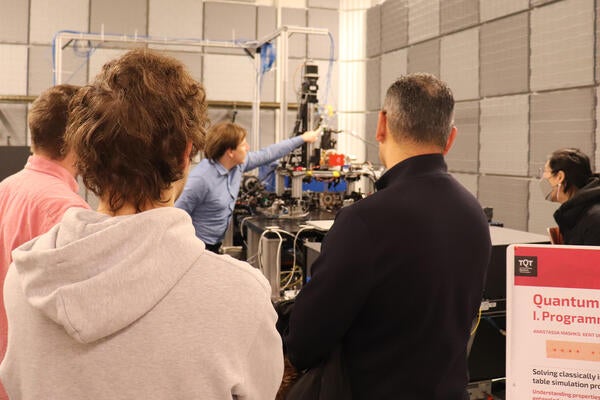
Prime Minister announces $12M for new water tech partnerships
Waterloo’s Velocity Science entrepreneurs meet with Trudeau and the Minister of Innovation, Science and Economic Development

Waterloo’s Velocity Science entrepreneurs meet with Trudeau and the Minister of Innovation, Science and Economic Development
By Katrina Schigas Marketing and Strategic Communications
Prime Minister Justin Trudeau and the Minister of Innovation, Science and Economic Development visited the University of Waterloo today to announce $12 million in funding to bring industry and academic researchers together to build the next generation of water technologies.
Along with Feridun Hamdullahpur, president and vice-chancellor of the University, and Dean of Science Bob Lemieux, Trudeau and Innovation Minister Navdeep Bains also met with Velocity Science student entrepreneurs. Waterloo’s Velocity Science program is a discovery space where world-renowned scientists mentor entrepreneurs who are creating startups in the life and physical sciences.
“It’s always a pleasure to see so many innovative, enthusiastic young people and extraordinarily inspiring Faculty. Thank you so much for showing me some of the great work that’s being done here at this amazing institution,” said Trudeau.
The $12 million, from the Federal Economic Development Agency of Southern Ontario, is being provided to the Southern Ontario Water Consortium (SOWC), which is located on the University of Waterloo campus. SOWC leads the development of business-led partnerships with post-secondary institutions to create innovative products, technologies and services for the water sector in southern Ontario.
“We can’t wait to see what our most innovative Canadian companies have in store for our communities. The future is within our grasp and no where is that more clear than in the extraordinary community of Waterloo,” said Trudeau.

Members of Velocity start up company Acorn (right) meet with Justin Trudeau (middle) and Feridun Hamdullahpur (left) on a tour of the new Science Teaching Complex.
Hamdullahpur said: “Today’s announcement further establishes the Southern Ontario Water Consortium, the University of Waterloo, and Canada, as leaders in environmental stewardship and innovation.
“As Canada’s most innovative university, Waterloo is a leader in partnering with industry through research collaboration and co-operative education and in bringing multidisciplinary teams together to tackle problems in key frontier disciplines like quantum science, aging populations, and water management,” he added.
The SOWC is currently facilitating several projects with scientists at the University of Waterloo, all of whom are members of the Water Institute:
Up to 90 businesses and not-for-profit organizations in southern Ontario are expected to benefit from the funding through the development and advancement of up to 80 collaborative water projects. The investment is expected to support at least 14 new partnerships and create or maintain 520 jobs over the course of the project.
"We need innovation; the kind of hard work, experimentation and creativity that the University of Waterloo is known for," said Innovation Minister Bains. "I saw this first hand during the tour of the Velocity centre."
Leveraging access to world-class research facilities and academic institutions, the SOWC’s Advancing Water Technologies program focuses on assisting small- to medium-sized enterprises by providing financial contributions and helping in the development of projects and proposals.
“The support announced today will be a catalyst for industry-led collaborations in the water sector. It will enable SOWC to help Ontario companies leverage world-class academic expertise and real-world demonstration facilities to develop water technologies for successful introduction to the market,” said Brenda Lucas, executive director of the SOWC. “We look forward to working with our many partners to advance globally-competitive and market-ready products and services in this important sector.”

Read more
Here are the people and events behind some of this year’s most compelling Waterloo stories

Read more
TQT Quantum Opportunities and Showcase sheds light on quantum research advancements, discoveries and real-world applications

Read more
President Kolinda Grabar-Kitarović will tour the Institute for Quantum Computing
The University of Waterloo acknowledges that much of our work takes place on the traditional territory of the Neutral, Anishinaabeg and Haudenosaunee peoples. Our main campus is situated on the Haldimand Tract, the land granted to the Six Nations that includes six miles on each side of the Grand River. Our active work toward reconciliation takes place across our campuses through research, learning, teaching, and community building, and is co-ordinated within the Office of Indigenous Relations.